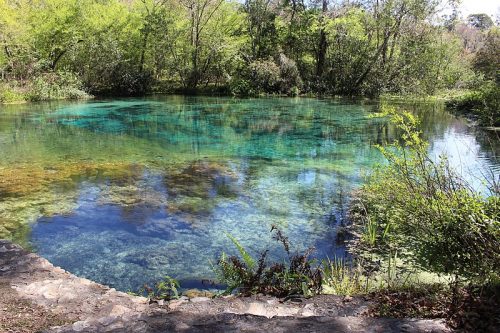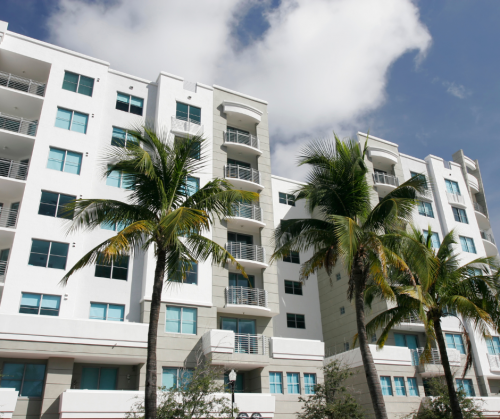More than 1,000 people move to Florida every single day. As people pour into the state, policymakers must plan how to balance this growth with the health of the state’s natural resources. This legislative session, a bill that would tighten restrictions on development in Florida State Parks takes center stage, as well as bills to improve and expand upon existing incentives to prepare properties for the potentially devastating effects of hurricanes.
The Florida State Park Preservation Act

The Florida Park Service is one of the largest in the country and manages the state’s trails, historic sites, and 175 state parks. In August of 2024, Gov. Ron DeSantis came under fire for the “Great Outdoors Initiative,” a plan that proposed building lodgings, golf courses, and pickleball courts in many of Florida’s state parks, after the plans were leaked by a whistleblower within the Department of Environmental Protection (DEP). Its announcement sparked bipartisan outrage from residents, activists, and lawmakers across Florida. Following the pushback, Gov. DeSantis declared that he would put the project on hold and seek more public input to the project before moving forward. This has culminated in the introduction of one of the most talked about bills this legislative session.
CS/SB 80, introduced by Sen. Gayle Harrell (R), which would become the “State Park Preservation Act” and its companion bill CS/HB 209 put forward by the Natural Resources Disasters Subcommittee, Rep. John Snyder (R) and Rep. Peggy Gossett-Seidman (R) have been put on the table to tighten restrictions on new development in Florida State Parks. “Our state parks are so unique, we want to make sure that they are there for the enjoyment and the conservation of our natural resources,” Sen. Harrell told the Tampa Bay Times. Specifically, CS/SB 80 would prevent development for recreational use that is not “conservation-based,” which includes a list of recreational activities including fishing, camping, swimming, and more. The bill also gives examples of what types of recreational uses are not conservation-based, specifying that the the term does not include “sports that require sporting facilities, such as golf courses, tennis courts, pickleball courts, ball fields, and other similar facilities”.
The bill also implements practices that would lead to better transparency, including a requirement that public hearings be held in the event of any updates to land management plans, which address a range of topics from habitat restoration and improvement to public access and recreational opportunities. Currently, public hearings are only required when new land management plans are in development.
Though the State Park Preservation Act is for the most part enjoying bipartisan support, there are still critics. Some environmental advocacy groups worry that the bills still don’t do enough to protect state parks in the long term. They are advocating for legislators to strengthen the bills’ language by adding a list of prohibited activities, eliminating vague terminology, including protections for state forests in the proposal, and tightening phrases that may leave room for loopholes. “It’s important not to just blindly support the bill,” Eve Samples of Friends of the Everglades told Florida Today. “We’re happy the bill was filed, but also to make sure that it comes in for a successful and strong landing.”
You can read more about the State Park Preservation Act in our Habitats and Biodiversity section.
UPDATE: CS/SB 80 Laid on Table, refer to CS/HB 209; CS/HB 209 Approved by Governor – Chapter No. 2025-76
My Safe Florida Home
SB 1466 introduced by Sen. Nick DiCeglie (R) and the identical HB 851 introduced by Rep. Chip LaMarca (R) would create the My Safe Florida Home Trust Fund within the Department of Financial Services. The bills would also require that, within two months of the declaration of a state emergency, 5% of state sales tax from affected counties be distributed into the fund. The fund would bolster the “My Safe Florida Home” grant program which was revived in 2022 after a period of dormancy. The program allocates funds to homeowners who make updates to improve their homes resiliency against hurricanes, however, demand for the program has far exceeded the funding available.
The bill is being championed by Florida’s chief financial officer Jimmy Patronis (R), who said in a statement that “This legislation is a proactive step towards safeguarding our communities from hurricanes and keeping insurance costs in check . . . This is pain and suffering money and should be given back to Floridians to help in protecting their homes from future hurricanes.”
Another bill, HB 1459 sponsored by Rep. Lindsay Cross (D), would expand coverage of the My Safe Florida Home program to include some grants for flood damage mitigation updates.
UPDATE: SB 1466 died in Finance and Tax; HB 851 died in Natural Resources & Disasters Subcommittee; HB 1459 died in Insurance & Banking Subcommittee
Building Resiliency
 As Florida has seen an increase of extreme weather events that have caused substantial damage to Florida homes and businesses, new requirements have been introduced to make sure that these buildings are able to withstand our changing weather patterns.
As Florida has seen an increase of extreme weather events that have caused substantial damage to Florida homes and businesses, new requirements have been introduced to make sure that these buildings are able to withstand our changing weather patterns.
Many of these regulations have been created in response to the 2021 collapse of the Surfside condominium tower, which killed 98 people. The tragedy highlighted the need both for more stringent safety protocols, and for laws that would hold property owners accountable in the event that safety procedures were not followed.
However, these regulations have also led to financial troubles for many Florida property owners. According to a survey released in February by the Associated Industries of Florida (AIF) Center for Political Strategy, property insurance costs were the primary concern of 33% of Florida voters. The My Safe Florida Condominium Pilot Program was launched in 2024 to provide grants to assist condo owners in making required updates to their buildings. SB 62 introduced by Sen. Ana Maria Rodriguez (R) and its companion CS/HB 143 introduced by Rep. Webster Barnaby (R) would offer tax credits to qualifying owners of “resilient buildings” – owners who have used the pilot program to make improvements to their homes. However, the bill does also place limitations on the types of properties that would qualify for the tax credits. If passed, some detached buildings and buildings that are three stories or less would be excluded.
Another bill, SB 1316 introduced by Sen. Erin Grall (R) would create the “Resilience District Act of 2025.” This is an attempt to better provide resources for projects such as flood and sea level rise mitigation in locations that do not currently benefit from state grants that primarily target more highly populated areas of the state.
UPDATE: SB 62 died in Finance and Tax; CS/HB 143 died in Industries & Professional Activities Subcommittee